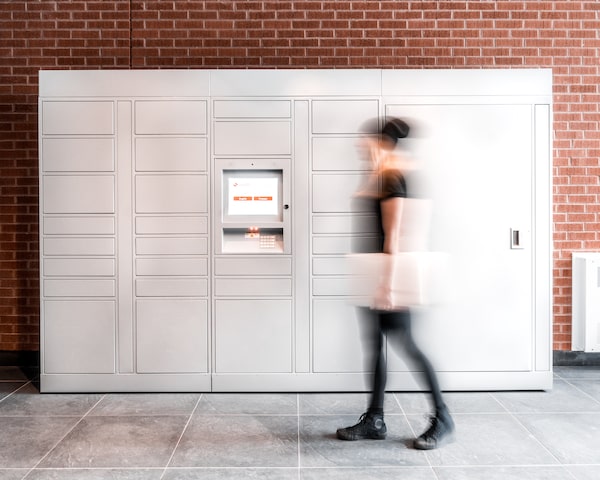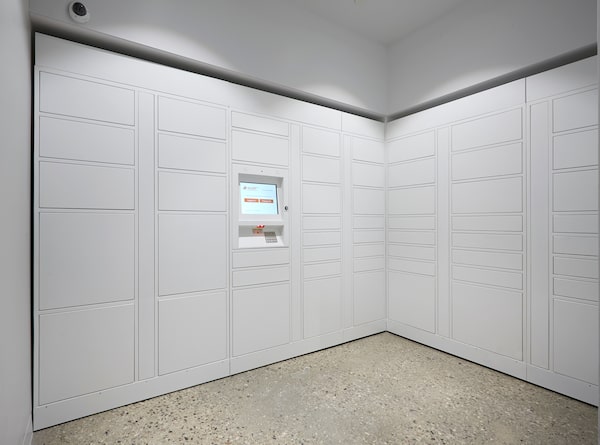
Snaile has smart-locker installations in 23 Canadian cities.Ty Tran/Supplied
The Covid-19 pandemic has had at least one positive effect on Richard Myers’s business. Users of Alternawork, his 25,000-square-foot co-working offices in Oakville, Ont., can now safely receive and send packages without signatures or other human interaction.
The pandemic helped with the signature aspect, with many shipping companies and couriers dropping the requirement in order to maintain physical distancing. But “smart lockers” have also been key in allowing them to deliver and securely store packages until office users are ready to pick them up.
Infrared light sensors in the lockers detect when a package is inserted, at which point a notification is sent by text message or e-mail to alert the recipient that there’s mail waiting for them. It works the same in reverse – users can insert packages and let carriers know they’re ready for pickup.
In either case, the recipient scans a QR code or enters a supplied PIN onto a touch screen that then opens their respective locker slot.
These capabilities helped Alternawork, which has a second location in Kelowna, B.C., mitigate the worst months of the pandemic without having to close down, which has been a boon to the enterprise clients who use its offices.
The small company’s experience could be a taste of what’s to come for the larger commercial real estate sector as property managers and developers look to ensure physical distancing in workplaces for the foreseeable future.
“It was perfect because we were able to have package delivery, but touchless,” Mr. Myers says. “That was a big deal for us.”
The smart lockers used by Alternawork are supplied by Snaile, a Mississauga-based company founded in 2015 by serial entrepreneur Patrick Armstrong after Canada Post announced it was planning to end door-to-door delivery and shift to community mailboxes.
The company developed the sensor and notification technology that, when installed inside existing lockers, could save people from making pointless trips to their mailboxes.
But Mr. Armstrong was left without an obvious market after the Liberal government scrapped the conversion plan. He was then approached by private equity real estate investment firm KingSett Capital about developing a full product – the sensor and notification technology, plus the mailboxes themselves.
Snaile has since grown to 14 full-time employees, with smart locker installations in 23 Canadian cities. Property company partners include Oxford and Cadillac Fairview.

Many Snaile installations are in residential buildings, such as this one in midtown Toronto.Chris Barnes/Supplied
Most installations are residential – multifamily apartment buildings and condos – but the company also has a handful of corporate clients, including Alternawork and Ontario Power Generation, which uses Snaile lockers at its downtown Toronto offices on University Avenue.
Mr. Armstrong says he is in talks with a number of commercial property developers, who are now assessing the role that smart lockers can play in a postpandemic world.
Many office tower managers, for example, are looking for ways to decrease the amount of foot traffic in their buildings. Installing smart lockers in lobbies could be one way to do that.
“Everyone is wondering what we are going to do when we go back to work. It’s a fresh problem, it’s going to be a big problem,” he says. “They are trying to limit [mail] carriers running around in the elevators.”
Snaile lockers are accessible by a number of major carriers, including FedEx, Purolator, DHL and Intelcom, one of Amazon’s largest package delivery services in Canada. A notable holdout, however, is Canada Post, with whom Mr. Armstrong is trying to work out a deal.
Canada Post has increased the number of mechanical lockers in residential buildings across the country to more than 11,000, from 9,300 at the end of 2019. Though the lockers don’t have sensors or internet connectivity, package recipients still get email or Canada Post app notifications when a delivery is made.
A spokesperson would not comment on negotiations with Snaile but said the Crown corporation recently underwent a request for proposal process for future parcel locker offerings and is not yet in a position to release details.
Snaile is facing competition in the corporate field, potentially from Canada Post, but also from the likes of Pitney Bowes, which is marketing similar Intelligent Lockers to property managers and developers.
Industry observers say demand for smart lockers in commercial properties was low before the pandemic, but the new reality may indeed change that. Finding space for them in existing buildings could prove problematic, but they are likely to be no-brainers in future developments.
“Keeping couriers out of the building may increasingly become the norm,” says Oliver Tighe, executive managing director of Colliers valuation and advisory services group for the Greater Toronto Area. “For new buildings, it has become a standard feature rather than a unique feature.”
April Franco, associate professor of economics and strategy at the University of Toronto Scarborough, expects there will be a race to install smart lockers among property developers and the companies that supply them.
With limited space, few building managers will want to install more than they have to, similar to utility lines, which means the competition will be fierce. Locker providers that provide ubiquitous interoperability with carriers are likely to have the advantage.
“This is one of those things that people say, ‘Of course, why didn’t we think of this before?’ The pandemic is acting as a coordinating device,” she says. “The fixed costs are big and we don’t want to have three or four sets of [lockers] out there.”